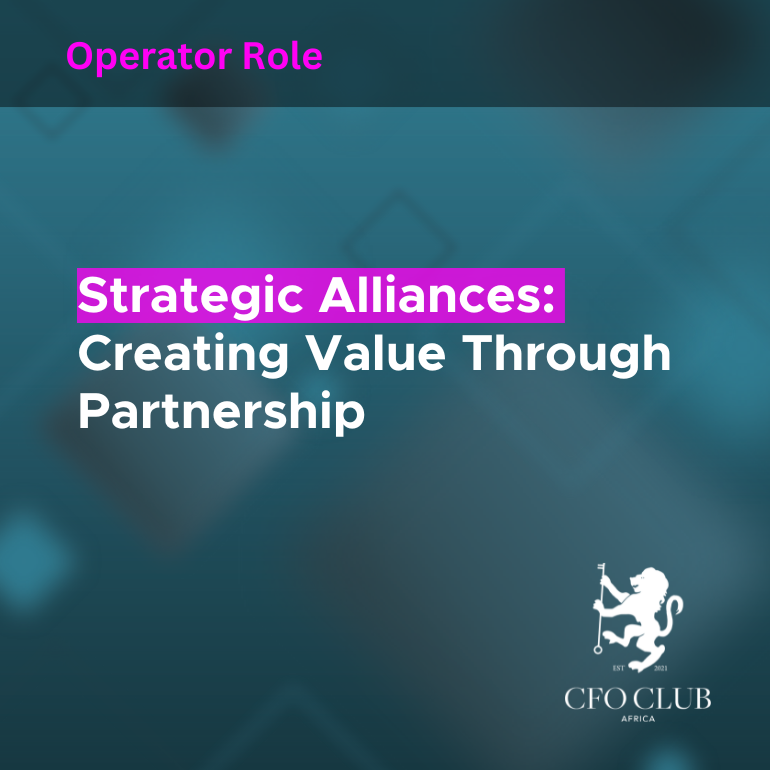Strategic Alliances: Creating Value Through Partnership
“Two heads are better than one”—a cliché in conversation but a powerful truth in business. In a competitive market, the most successful companies don’t just compete—they collaborate. Strategic alliances, where businesses join forces to share resources, expertise, and market opportunities, are transforming industries worldwide. For CFOs in South Africa, the key to unlocking exponential growth lies not in going it alone, but in forming partnerships that amplify strengths and overcome challenges.
What Is a Strategic Alliance?
A strategic alliance is a formal arrangement between two or more businesses that allows them to collaborate without merging. The idea is simple: leverage the strengths of each partner to achieve objectives neither could accomplish alone. Whether it’s co-developing products, accessing new markets, or sharing technological expertise, the possibilities are vast.
The Value of Strategic Alliances
- Market Expansion: Alliances open doors to new markets, whether regional, national, or international.
- Shared Resources: Partners share expensive assets like technology, infrastructure, and human expertise.
- Risk Mitigation: Joint ventures spread risks across parties, making high-stakes projects more viable.
- Innovation Acceleration: Collaborating with experts outside your organisation often sparks fresh ideas and solutions.
A South African Success Story: Woolworths and Engen
One of South Africa’s most notable strategic alliances is the partnership between Woolworths, a premium food and retail giant, and Engen, one of the country’s leading fuel companies. This alliance began in 2008 and has since become a case study in creating value through strategic partnerships.
The Opportunity
In the mid-2000s, Woolworths sought to expand its convenience food offerings but faced logistical and infrastructure challenges. Engen, on the other hand, was looking for ways to differentiate its fuel stations by offering added value to customers. The solution? Leverage each other’s strengths to create something entirely new.
The Execution
The alliance resulted in the rollout of Woolworths Food Stops at Engen fuel stations across South Africa. Woolworths handled the supply chain, delivering its signature quality food items, while Engen provided the real estate and customer traffic. Together, they created a unique shopping experience for on-the-go consumers.
The Results
- Revenue Growth: Woolworths gained access to a wider customer base while Engen saw increased foot traffic and fuel sales.
- Customer Loyalty: Both brands strengthened their market positions by offering unparalleled convenience and quality.
- Scalability: The success of the partnership allowed rapid expansion, with over 100 locations opened within a few years.
Why It Worked
- Aligned Goals: Both companies aimed to enhance customer convenience and increase market share.
- Clear Roles: Each party leveraged its strengths—Woolworths focused on food quality, while Engen ensured logistical efficiency.
- Trust and Communication: Regular dialogue and shared KPIs kept the partnership on track.
This alliance not only delivered impressive financial results but also reshaped consumer expectations for convenience retailing in South Africa. It’s a shining example of how strategic partnerships can drive innovation and growth.
Lessons for CFOs: Making Strategic Alliances Work
- Identify Complementary Strengths
Look for partners whose capabilities fill gaps in your own business. Woolworths and Engen succeeded because they each brought unique, non-overlapping strengths to the table. - Establish Clear Agreements
Define roles, responsibilities, and expected outcomes in detail. Ambiguity is a recipe for conflict. - Focus on Long-Term Value
Strategic alliances should be built for sustainability. Consider how the partnership will evolve over time and whether it can adapt to changes in the market. - Measure Success Regularly
Track KPIs like revenue growth, market share, or customer satisfaction. If the alliance isn’t delivering, reassess the terms or the partner.
Conclusion
Strategic alliances aren’t just an option; they’re a necessity for businesses looking to thrive in today’s competitive landscape. For South African CFOs, partnerships like Woolworths and Engen demonstrate how collaboration can unlock new opportunities, mitigate risks, and drive long-term success.
The next time your business faces a challenge or identifies an untapped market, think strategically. Who can help you achieve your goals faster, better, or more efficiently? The right alliance could be the catalyst for your next breakthrough.

